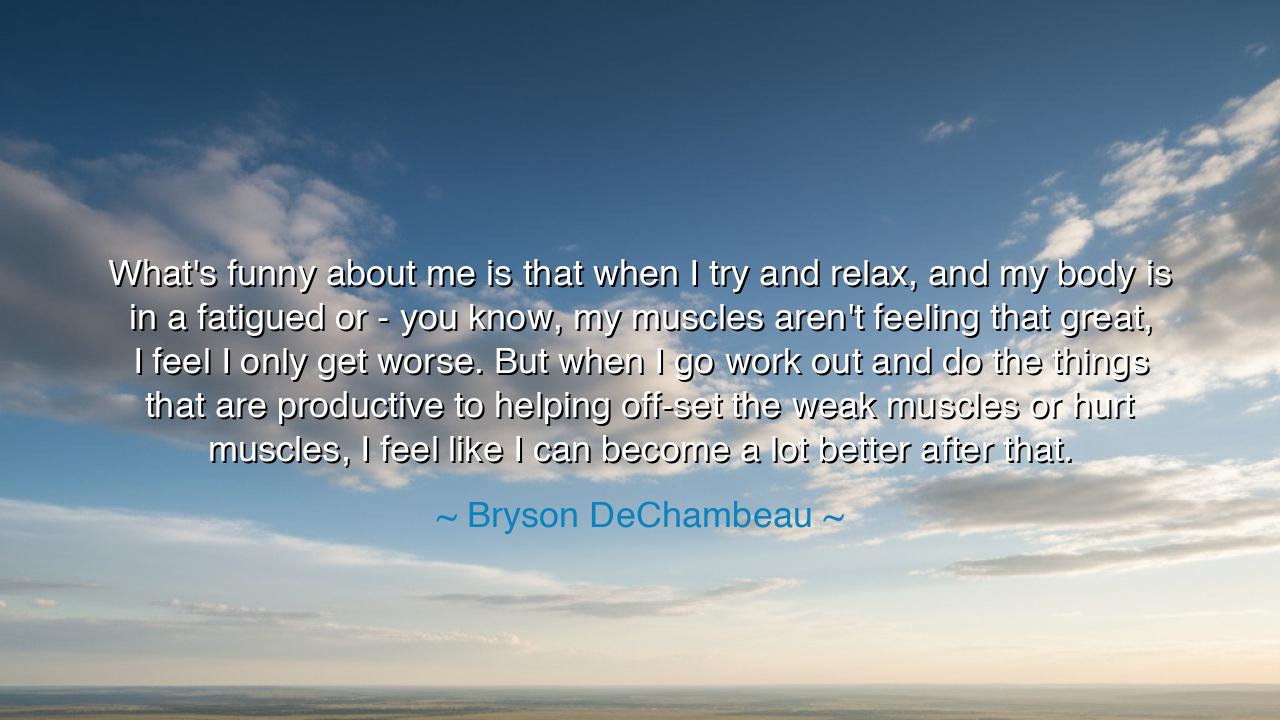
What's funny about me is that when I try and relax, and my body
What's funny about me is that when I try and relax, and my body is in a fatigued or - you know, my muscles aren't feeling that great, I feel I only get worse. But when I go work out and do the things that are productive to helping off-set the weak muscles or hurt muscles, I feel like I can become a lot better after that.






Hear, O seekers of strength and balance, the words of Bryson DeChambeau, the athlete-philosopher who speaks not merely of muscle, but of spirit. He said: “What’s funny about me is that when I try and relax, and my body is in a fatigued or—you know, my muscles aren’t feeling that great, I feel I only get worse. But when I go work out and do the things that are productive to helping off-set the weak muscles or hurt muscles, I feel like I can become a lot better after that.” In this statement lies a paradox as old as time—the truth that healing often comes not from stillness, but from motion; that rest without purpose breeds decay, but struggle with direction breeds renewal.
For the ancients knew this well: the river that ceases to flow becomes stagnant, and the warrior who lays down his sword too long forgets its weight. DeChambeau speaks not merely of the body, but of the law of vitality—that the living must move to remain alive. When he says that rest makes him worse, he reveals the secret known to those who have mastered both craft and self: that true restoration is active, not passive. His workout is not rebellion against pain, but a dialogue with it—a way of teaching the body to rise again, to rebuild through disciplined effort what weakness would steal away in silence.
Consider the story of Milo of Croton, the ancient Greek wrestler whose strength became legend. Each day, he lifted a newborn calf upon his shoulders, and each day the calf grew heavier. Yet through persistence, Milo’s body adapted until he could bear the weight of a full-grown bull. So it is with the human spirit. Those who wait for ease will never know endurance; those who seek comfort will never find growth. DeChambeau’s insight is the modern echo of this ancient wisdom: that the cure for weariness is not to withdraw from struggle, but to meet it with intelligent action.
There is a profound wisdom in his self-awareness—his admission that idleness leads not to recovery, but to further decline. Many, when weary, mistake rest for healing and end up weaker than before. Yet motion, guided by discipline, rekindles strength. This is not to say that one must never rest, but that rest must serve the purpose of renewal, not surrender. The muscles of the body are mirrors of the soul: if unused, they shrink; if tested, they thrive. Thus, DeChambeau’s philosophy is not merely about sport—it is about the ethic of persistence that governs all human flourishing.
Even in the world of ideas and creation, this truth stands firm. The philosopher who ceases to think, the artist who stops painting, the leader who ceases to strive—all decay in spirit. The fire within must be tended, not smothered by comfort. The poet Homer, though blind, continued to see with the eyes of imagination; Leonardo da Vinci, though restless, could never be still, for motion was his meditation. In them, as in DeChambeau, we see the same eternal truth: that the body and mind are like the bow of the archer—when strung and stretched with purpose, they gain power; when left slack, they lose their shape.
Therefore, let this teaching become your guide: when you are tired, move wisely, not mindlessly. Do not confuse stillness with peace, or fatigue with finality. When pain comes, listen to it—not as an enemy, but as a teacher showing where strength must grow. Work the sore places, both of muscle and of mind, until they become resilient. Like the blacksmith who tempers steel by fire and hammer, temper yourself through action, and you will find that fatigue transforms into fortitude.
So, my child of endeavor, take these words into your heart. When life presses upon you, do not retreat into idleness; instead, engage with purpose. Act where others would surrender. Move where others would rest. For healing is not found in the absence of effort, but in the harmony between effort and understanding. As Bryson DeChambeau discovered, the path to strength lies not in waiting for recovery, but in building it—one motion, one breath, one act of courage at a time.






AAdministratorAdministrator
Welcome, honored guests. Please leave a comment, we will respond soon